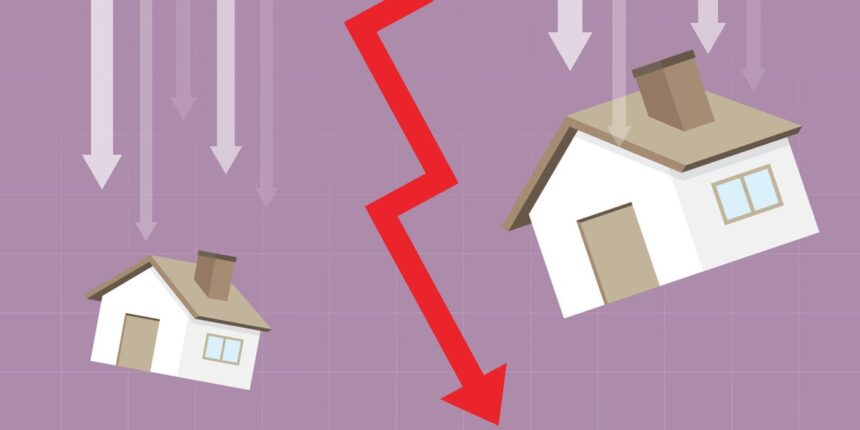America’s property market is due for a correction.
That’s according to Chris Vermeulen, a longtime strategist who’s the founder of The Technical Traders. He thinks real estate is on the verge of a steep price correction, and he’s forecasting that both residential and commercial properties could soon experience a wave of distress, causing prices to plunge about 30% in both markets.
“People are going to have to start to sell their homes,” Vermeulen told Business Insider in an interview this week. “What we’re starting to see is people starting to realize they can’t afford their mortgages, or they need to downgrade. A lot of people are struggling financially, and this is really the tip of the iceberg. Give it another two or three years — that’s when the real-estate market gets hit the most.”
His forecast is among the more dire sounded by real-estate commentators in recent months. Most observers expect home prices to stay elevated over the near to medium term, but Vermeulen said the signs pointing to a big move down were beginning to add up, noting a weak backdrop for the US economy that could end up hitting consumers — and particularly, mortgage holders — hard.
Americans are already showing signs of weakness. Retail sales have been unexpectedly soft for the past two months, according to data from the Census Bureau, with purchases rising just 0.1% over May. Vermeulen said that implied corporate profits were set to weaken, which could spark more layoffs or reduced hours for workers as businesses trim costs and try to keep shareholders happy.
“People are starting to get laid off as unemployment rises. People have burned through their savings, and inflation is crazy higher,” he said, adding, “Eventually, people aren’t going to be able to pay their mortgages.”
Most mortgages in the US are 30-year fixed rates, and many existing mortgages have been locked in at lower rates from several years ago. But Vermeulen said Americans tend to “stretch themselves too thin” when purchasing their homes, which means some borrowers could eventually buckle financially as unemployment ticks higher.
The fallout in the commercial real-estate sector could meanwhile be more severe. Bloomberg reported that the sector had more than $900 billion in debt approaching maturity this year, after which it will have to be refinanced at higher rates and with potentially lower property values.
Commercial foreclosures were 117% in March on an annualized basis.
Vermuelen predicted that the Fed would eventually pull back interest rates as the economy tips into a recession. But he said banks, bearing huge losses in their mortgage and commercial real-estate portfolios, would be more hesitant to lend, weighing on demand and causing real-estate prices to plunge.
Vermeulen said that while a 50% correction was possible in some areas, he was expecting “somewhere around a 30% correction in real estate.”
Property prices could drop by about 30% across the entire residential and commercial property market, he added.
Those losses could take seven to 10 years to recover from, he said, because of the long nature of real-estate cycles.
“The price of real estate has doubled or tripled in the last couple of years. It’s pretty wild. And usually, when an asset goes up that much that quickly, it usually comes back and pulls and corrects,” Vermeulen added. “It’s going to be an incredible opportunity for people who can identify the bottom.”
Still, most real-estate veterans don’t expect the residential housing market to crash. The National Association of Realtors previously said the US housing market was so short on inventory it could take at least three or four years for supply and demand to balance out, and low supply would keep a floor underneath home prices for the foreseeable future.











